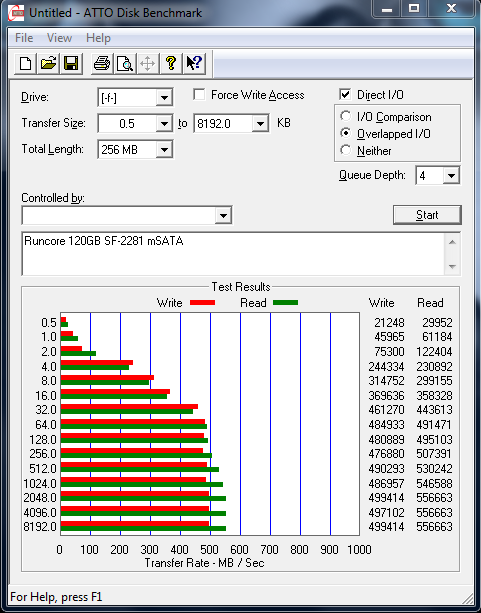ATTO Disk Benchmark is perhaps one of the oldest benchmarks going and is definitely the main staple for manufacturer performance specifications. ATTO uses RAW or compressible data and, for our benchmarks, we use a set length of 256mb and test both the read and write performance of various transfer sizes ranging from 0.5 to 8192kb. Manufacturers prefer this method of testing as it deals with raw (compressible) data rather than random (includes incompressible data) which, although more realistic, results in lower performance results.
 The original specifications believed for the Runcore T50 mSATA 6Gbps 120GB SSD were a mere 554MB/s read and 469MB/s write which are now altered on Runcore’s Specifications Page to 540MB/s read and 500MB/s write. Our results of 556MB/s read and 499MB/s write are almost dead on and well above what we expected for a first release of a SATA 3 mSATA SSD.
The original specifications believed for the Runcore T50 mSATA 6Gbps 120GB SSD were a mere 554MB/s read and 469MB/s write which are now altered on Runcore’s Specifications Page to 540MB/s read and 500MB/s write. Our results of 556MB/s read and 499MB/s write are almost dead on and well above what we expected for a first release of a SATA 3 mSATA SSD.
CRYSTAL DISK BENCHMARK VER. 3.0 X64
Crystal Disk Benchmark is used to measure read and write performance through sampling of raw (0/1 Fill/compressible) or random data which is, for the most part, incompressible. Many new SSD owners who cant wait to test the performance of their SSD often grab this program and run a quick test, not realizing that they are testing with incompressible data rather than compressible data used in testing by manufacturers. The following results will show 0Fill data (compressible) on the left with random data sample results (incompressible) on the right.

 Considering the importance low 4k random write performance plays in the users visible upgrade from a hard drive, the result of 97MB/s an absolutely amazing result. Remember, this is the industries first release of a 6Gbps mSATA SSD and it is also one of the smallest form factors available.
Considering the importance low 4k random write performance plays in the users visible upgrade from a hard drive, the result of 97MB/s an absolutely amazing result. Remember, this is the industries first release of a 6Gbps mSATA SSD and it is also one of the smallest form factors available.
This praise was pretty much all we could muster for ‘Crystal’ specific testing and we almost believed that Crystal didn’t like the Runcore T50 whatsoever. In ‘oFill’ or compressible data testing, we are used to seeing results for SSDs sit lower than ATTO and in the area of 500MB/s but couldn’t get the high sequential and 512k write score up no matter how hard we tried.
As well, we weren’t impressed at all with the random data sample Crystal test (or incompressible) as this NAND is listed as synchronous NAND flash memory. Could this be a result of only 4 modules moving data rather than eight or sixteen? Quite possibly. Predictions with respect to PCMark Vantage testing are getting tough to call however.
ANVIL STORAGE UTILITIES PROFESSIONAL
You may not see this for long (and its definitely not common) but you get a freebee simply for reading! Over the last little while, we have been assisting with beta testing new benchmark software called Anvil Storage Utilities which is an absolutely amazing SSD benchmarking utility. Not only does it have a preset SSD benchmark, but also, it has included such things as endurance testing and threaded I/O read, write and mixed tests, all of which are very simple to understand and utilize in our benchmark testing. Recently, we published the exclusive public release here and, if you happen to check it out, there is a FREE download of the software! Lets see how the Future Storage 240GB SSD fares on the Anvil Pro:
 Once again we see the low writes but we were totally shocked to see just under 82000IOPS at low 4k random write disk access QD16. This is well above Runcore’s listed high of 60000IOPS. Lets see if we can push it just a bit shall we?
Once again we see the low writes but we were totally shocked to see just under 82000IOPS at low 4k random write disk access QD16. This is well above Runcore’s listed high of 60000IOPS. Lets see if we can push it just a bit shall we?
This is without a doubt pushing things as the result of 84113IOPS is the highest we have pulled off of any SATA 3 SSD to date! Looking to the right though, the result of 83202IOPS is also the best we have pulled off while using mixed (random) data once again.
INDEX
Pg1 – Introduction, Compatibility & Packaging
Pg2 – Internals, Test Bench & Testing Protocol
Pg3 – ATTO, Crystal Disk Mark and Anvil Storage Utilities
Pg4 – HDTune Pro Benchmarks
Pg5 – PCMark Vantage Testing, mSATA SSDs Compared & The SSD Hierarchy
Pg6 – The Verdict
 The SSD Review The Worlds Dedicated SSD Education and Review Resource |
The SSD Review The Worlds Dedicated SSD Education and Review Resource | 